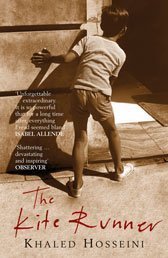‘The Kite Runner’ – Khaled Hosseini

‘The Kite Runner’ of Khaled Hosseini’s deeply moving fiction debut is an illiterate Afghan boy with an uncanny instinct for predicting exactly where a downed kite will land. Growing up in the city of Kabul in the early 1970s, Hassan was narrator Amir’s closest friend even though the loyal 11-year-old with “a face like a Chinese doll” was the son of Amir’s father’s servant and a member of Afghanistan’s despised Hazara minority. But in 1975, on the day of Kabul’s annual kite-fighting tournament, something unspeakable happened between the two boys.
I devoured Hosseini’s ‘A Thousand Splendid Suns’ and was keen to read ‘The Kite Runner’, particularly after seeing the film several years ago. But I found this novel difficult to get into and did not find it as gripping or engaging as her previous work. That being said, I didn’t think this was a terrible book and one that does deserve your attention.
Funnily enough, the theme of kite running does not feature heavily in this book, but instead follows Amir and how his life changed from an unspeakable event he observed during the kite tournament. I find this makes the novel more of a drama as we watch how Amir reacts to what he has seen and how this haunts him growing up. When him and his father are forced to flee their home due to fighting and unrest, you feel that Amir is seeking some closure. But living in America does not give him the clean conscience he was hoping for.
I found the second half of the novel more engaging and think this was because Amir returns to Afghanistan. The changes that the country has undergone was difficult for Amir to accept, especially the scene in the stadium. This reminded me of ‘A Thousand Splendid Suns’ and wondered if Hosseini already had the story for her follow-up novel and made me a little wistful that ‘The Kite Runner’ was not proving as enjoyable.
The second half of the novel was certainly faster-paced and I was keen to see Amir return to safety. He finally confronts his childhood demons and by the end of the novel, readers assume that he has finally found that inner peace he had been searching for for so many years. The novel comes full circle and finishes with the kites and this charming ending reinforces the closure that Amir had desired.
I’m not sure whether I would re-visit this novel in a hurry, particularly as I found Hosseini’s other novel more enjoyable. That being said, I think it is worth looking at so you can make your own mind up. If this doesn’t tick all of your boxes but your are intrigued by the Afghanistan setting, then I believe you will get more satisfaction from reading ‘A Thousand Splendid Suns’.
